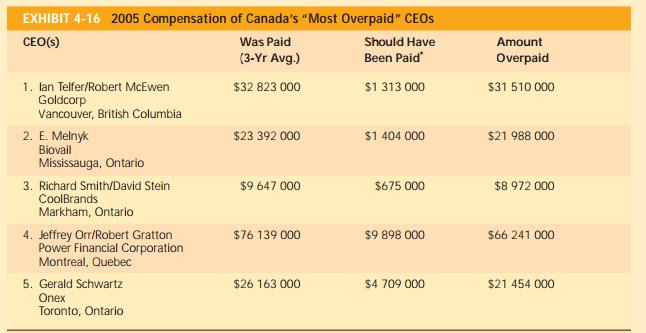Answered step by step
Verified Expert Solution
Question
1 Approved Answer
Critics have described the astronomical pay packages given to Canadian and American CEOs as rampant greed. In 2004, the average compensation of CEOs of Canadian
Critics have described the astronomical pay packages given to Canadian and American CEOs as “rampant greed.” In 2004, the average compensation of CEOs of Canadian companies that make up the S&P/TSX index was $5.5-million, nearly doubling the $3.5 million in compensation awarded in 2003. By comparison, the S&P/TSX index rose 14.5 in 2004 and profits at TSX companies were up 30 percent. How do you explain such large pay packages to CEOs? Some say this represents a classic economic response to a situation in which the demand is great for high quality top executive talent and the supply is low. Other arguments in favour of paying executives $1 million a year or more are the need to compensate people for the tremendous responsibilities and stress that go with such jobs; the motivating potential that 7- and 8-figure annual incomes provide to senior executives and those who might aspire to be; and the influence of senior executives on the company’s bottom line. (For example, research findings attribute a 15- to 25-percent variation in profitability to the leadership quality of CEOs.) Critics of executive pay practices in Canada and the United States argue that CEOs choose board members whom they can count on to support ever-increasing pay for top management. If board members fail to “play along,” they risk losing their positions, their fees, and the prestige and power inherent in board membership. In addition, it is not clear that executive compensation is tied to firm performance. For instance, KPMG found in one survey that for 40 percent of the respondents, there was no correlation between the size of the bonus and how poorly or well the company fared. Consider the data in Exhibit 4-16, which illustrates the disconnect that can sometimes happen between CEO compensation and firm performance. National Post Business writers calculated that the CEOs noted in the exhibit were overpaid, based on their companies performances for the year. Is high compensation of CEOs a problem? If so, does the blame for the problem lie with CEOs or with the shareholders and boards that knowingly allow the practice? Are Canadian and American CEOs greedy? Are these CEOs acting unethically? Should their pay reflect more closely some multiple of their employees’ wages? What do you think?

EXHIBIT 4-16 2005 Compensation of Canada's "Most Overpaid" CEOS CEO(S) Was Paid Should Have Amount (3-Yr Avg.) Been Paid Overpaid 1. lan Telfer/Robert McEwen Goldcorp Vancouver, British Columbia $32 823 000 $1 313 000 $31 510 000 2. E. Melnyk $23 392 000 $1 404 000 $21 988 000 Biovail Mississauga, Ontario $9 647 000 $8 972 000 3. Richard Smith/David Stein $675 000 CoolBrands Markham, Ontario $76 139 000 $9 898 000 4. Jeffrey Orr/Robert Gratton Power Financial Corporation Montreal, Quebec $66 241 000 5. Gerald Schwartz Onex Toronto, Ontario $26 163 000 $4 709 000 $21 454 000
Step by Step Solution
★★★★★
3.38 Rating (160 Votes )
There are 3 Steps involved in it
Step: 1
Is high compensation of CEOs a problem If so does the blame for the problem lie with CEOs or with the shareholders and boards that knowingly allow the ...
Get Instant Access to Expert-Tailored Solutions
See step-by-step solutions with expert insights and AI powered tools for academic success
Step: 2

Step: 3

Ace Your Homework with AI
Get the answers you need in no time with our AI-driven, step-by-step assistance
Get Started


